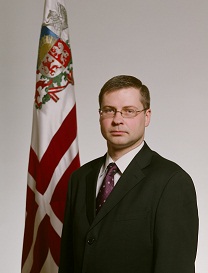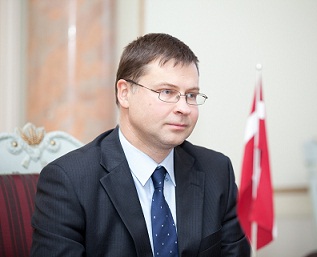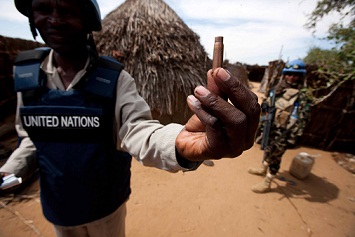
When he was first elected at the age of 37, Valdis Dombrovskis was Europe’s youngest prime minister. Now 41, Dombrovskis is considered responsible for much of the economic and political stability in his country. During his tenure the country has been admitted to the European Union, and at the beginning of 2014, Latvia will join the Euro Zone.
Dombrovskis discusses with Daily News Egypt a set of critical issues regarding the Egyptian revolution, the Arab Spring, the Palestine-Israel conflict, Iran’s nuclear programme and Egyptian-Latvian economic and political relations.
Except for one agreement to promote and protect investments between the two countries, signed in 1997, very few agreements have been signed between Egypt and Latvia. Why don’t we see something significant out of this agreement since it was signed about 15 years ago?
Just to give a background, diplomatic relations between the two countries were created more than 20 years ago. And in fact Egypt was one of the first countries in the Middle East and North Africa to recognize Latvia’s independence, which we certainly appreciate. Also since 2007, we’ve had an embassy in Egypt.
But as regards to investments and economic developments, that is primarily in the hands of businesses. They should come with their initiatives and seek opportunities. It is good to have this framework of investment protection, which means that possibilities are there. And the question is; how active are businesses from both sides to engage?
We have seen some increases in trade volumes in the past. However, now after the relations are maintained, they are significantly down. But again recently trade volumes are starting to increase with Egypt after the revolution. And as you know, Egypt is quite a popular tourist destination for Latvians.
Since Egypt represents a huge consumer market, are there any specific plans in the future to expand between the two countries?
Well, our embassy is working on creating some events in this regard. Also, sometimes when we have large ministerial level visits, we take some business delegations with us. And I see there are possibilities for businesses to actually come and seize the opportunities.
Concerning the relationship between the two peoples and how to reinforce cultural exchange and awareness between the two countries, are there any future projects in this regard popularising Latvia among Egyptians or vice-versa?
We know that we are relatively far away. In Latvia for example, we have The Arab Cultural Centre, which covers Egypt. But, since there are only some 120 Arabs living in Latvia and maybe only 30 of them are Egyptians, of course we have to try to put it in regional context. And I think the same is true for Egypt looking at Latvia in a regional context as Baltic or Nordic Baltic to develop that kind of cooperation. But we also do make use of some possibilities of other organisations like say Anna Lind Foundation, as an example.
Certainly, there are also some other possibilities there in 2014, when Riga is the cultural capital of Europe, which will help having some exchange with Egypt in this regard. And I know that some people are looking into that direction as well.
How do you see the particular role of Latvia in the dialogue between The EU and Egypt? What benefit can Latvians share with Egyptians in this regard?
As regards to the EU dialogue, in general we are supportive of increasing EU active rule in the neighbourhood, whether it is a partnership with the Mediterranean, North African or eastern partnership. In general, we are supportive of those developments. We are also supportive of facilitating trade links to promote free trade agreements and this kind of developments, which in turn will reinforce commercial ties and free trade between the EU and neighbouring countries.
Latvia’s reaction to Europe’s economic crisis was to increase austerity measures. How are these economic crisis measures going so far? And when do you expect the Latvian people to feel economically relaxed and reap the fruit of their patience?
Currently Latvia is the fastest growing EU economy. Last year we had an economic growth rate of 5.5 per cent, which made us third fastest growing EU economy. This year we are going to have economic growth maybe close to 5 per cent, which makes us the fastest growing EU economy. So, to an extent, one can say that the Latvian reform programme has worked.
What we mainly did when we were facing the crisis, is that we understood that we first needed to regain financial stability. So, we did very substantial austerity measures totalling 17 per cent of GDP. As a result, we were able to return it as we wanted. And financial stability here is not only about ratings, it is also about whether banks are lending to citizens and businesses, whether companies are investing and whether citizens are spending. For all of this, you need financial stability as a pre-condition. And as soon as we did it, we returned to economic growth and this is how it works now.
For our budget deficit this year, we expect it to be below 1.9 per cent of GDP. Next year it is going to move down to 1.4 per cent. So, we see that budget deficit is under control and the economy is growing.
We also have the structure of the economy changing. We now have more emphasis on industrial production and exports. Last two years we had an average of 10 per cent growth in industrial production and 30 per cent growth in exports. It is a quite sustainable increase.
Currently, one of the issues for Latvia is to join the Euro Zone. We already fulfilled the criteria, so we expect to join by January 1st 2014.
As for when people are starting to see the fruit of this economic growth, I think it is already happening. Unemployment is decreasing, which means that people are finding jobs. Also just this year, we are starting to raise salaries in the public sector. We started with teachers, employees of the interior system, justice system and the social system. Teachers have already gotten their salaries increased since September 1st. The rest of categories will get salaries increased as of January 1st next year. You’ll also see this wage growth happening in public sector as well as in the private sector.

Now, focusing more on Egypt. How would you evaluate the performance of post-Mubarak Egypt?
Certainly, I would say it was very impressive to see those developments during the Arab Spring and aspiration for democracy, for dignity and for good governance. Now I would say it is also clear that after such kind of events, a revolution if you want to call it that, there of course many challenges. You need to change the governance structure, so you probably need to deal with some corrupt officials, and so on. And sometimes there are some disappointments. But there is no immediate prosperity after the next day or next month following the revolution. It takes certain patience to overcome all those obstacles and set the governance structures right.
I think there have been some good steps taken. There were parliamentary elections, there is a democratically elected president. And now of course, there is this important constitution drafting process. Also it is important that principles of personal liberties, of gender equality, of minority rights be enshrined in a constitution. Now I think it is very important to see how this drafting of the constitution goes and then down to institutional building, sort to say.
Do you have concerns on the rise of political Islam in Egypt with the Muslim Brotherhood leading the government now?
This is why it is important to see this in constitution first. It is important to see those religious freedoms, minority rights, gender equality protected. Because again, this time you can really say that it is the democratic choice of the Egyptian people a free elections. This is how a government is composed. Then the question is, whether those political forces try to create another alternative regime or not? In this case, an Islamic one? Or they stick with the values of democracy? I think we still need to wait for the answer to this question. But of course we hope that those democratic principles will be observed. And in this case, if this is relevant to the Egyptian people to have this government now, maybe ten or twenty years later there will be a different composition of government. It is still premature to say. It is still in the institutions building stage.
What is the stance of Latvia regarding the Arab-Israeli conflict?
Our stance is similar to those of most of the EU countries. We prefer a two-country solution and we see that this should be achieved through negotiations.
No reference to 1967 borders?
Well, two-country solution, then to go into more details based, more or less, on the 1967 borders with possible land swaps, taking into account settlements near the borders. And of course Jerusalem is a big issue to be resolved.
Do you have any individual thoughts about how the issue of Jerusalem can be resolved?
We see it is a very complex issue. And of course we know that Palestinians also see it as their future capital. I do not have ready-made recipes and no one has. Otherwise it could have been resolved by now. But it is also clear that it takes political will from both sides to resolve it. And that is probably what we need. We need to concentrate, sit around the table and seriously negotiate for the two-state solution. Unfortunately, in the last years, we have not seen too much progress towards this solution.
I was personally an observer in the 2006 Palestinian Authority elections. At that time I was an observer from the European Parliament in the West Bank.
Having mentioned this, what do you think about the blockade enforced on Gaza after Hamas won elections?
Well, we know that Hamas is internationally recognized as a terrorist organisation, which states its aim to destroy the state of Israel. So, it is a question of whether Hamas is ready to transform itself. And of course as long as their declared aim is to destroy the state of Israel, I think no wonder Israelis are not willing to negotiate with them. What would they negotiate, their own destruction? So, I think it is now for Hamas to transform themselves. And it is also a question to Egypt now. How would Egypt deal with their border crossing? Will the borders be opening? What sort of control over the borders would be? I think it is a very big issue for Egypt.
And what’s your opinion on Iran’s nuclear issue and obtaining such kind of technology?
We respect Iran’s right to develop nuclear technology, but it’s important that Iran is also taking steps to address rest of the world’s concerns about the peaceful nature of this programme. And there have been some positive developments of this, which is to convert part of its highly enriched uranium for use in civilian reactors. Which is a good move, but it certainly also takes from Iran’s side more transparency and to actually ensure the world what the aim of this programme is.
Don’t you see a contradiction in European attitude against Iran in comparison to Israel that has a hostile nuclear technology?
Of course, we know the aim of many countries in the west is to ensure nuclear non-proliferation. And certainly right now Iran is seen as one of the points of worry. From this point of view, as I said, we respect Iran’s right to nuclear technology, but of course in a frame[work] of non-proliferation. We, the EU and other entities, would like to see a peaceful programme.
Back to Egypt and its revolution. What kind of a message would you send to the revolutionary youth, who are left out of political power?
This is exactly the point. If you are building up the democracy, there shouldn’t be such a thing as being left out of political power. This is because there are many ways to participate in political power. By forming political parties and being active through the NGO sector. By forming interest groups. I think to opening up and use much more opportunities to be engaged in political process or to be engaged in public process. It’s a bit of a question of self-organization right now to put this youth potential also to some productive directions. And there are many ways of doing it.
Also, maybe the EU can be looked at as a model of how to make a democratic system work, make a multi-party system work and how to make the NGO sector work.
What did it take to become prime minister of a country at the age of 37, like you did back in 2009?
Interestingly, I’m not the youngest prime minister in Europe anymore. Now the Finnish prime minister is a couple of months younger than I am. So, youth is something that tends to disappear unfortunately.
It was very important to me that I have this political experience. I have been working as the finance minister before. I have been working in the national parliament, the European parliament. I have been nominated as a prime minister from my party several times before. So, it not necessarily something that was unexpected. What was different that Latvia at that time was facing huge economic crisis and we had to deal with it.
So which position you think that made such a significant change in your political career?
In early 2002 we formed a new political party with the governor of Bank of Latvia, where I was working. Then in October 2002 we won the parliamentary elections and formed the government. At that time I was elected as a member of parliament and then I became the finance minister. Certainly being a member of parliament is a significant step in any case. Of course for us we have this system that if you are a minister you typically suspend your parliamentary mandate.
Do you have plans to visit Egypt anytime soon? And what is the most interesting touristic spot that you would like to invite your family to, escaping away from an official visit, if it happens?
Well, I’m very open to visit Egypt and I have been there a couple of times as a tourist before and been to quite a few places already. And I must say they are quite impressive indeed. Starting from the pyramids, the temples all the way to the Valley of Kings. And the Red Sea – I like diving – and it’s really one of the most beautiful places to dive. It’s something you should be careful to protect and sustain its beauty.


